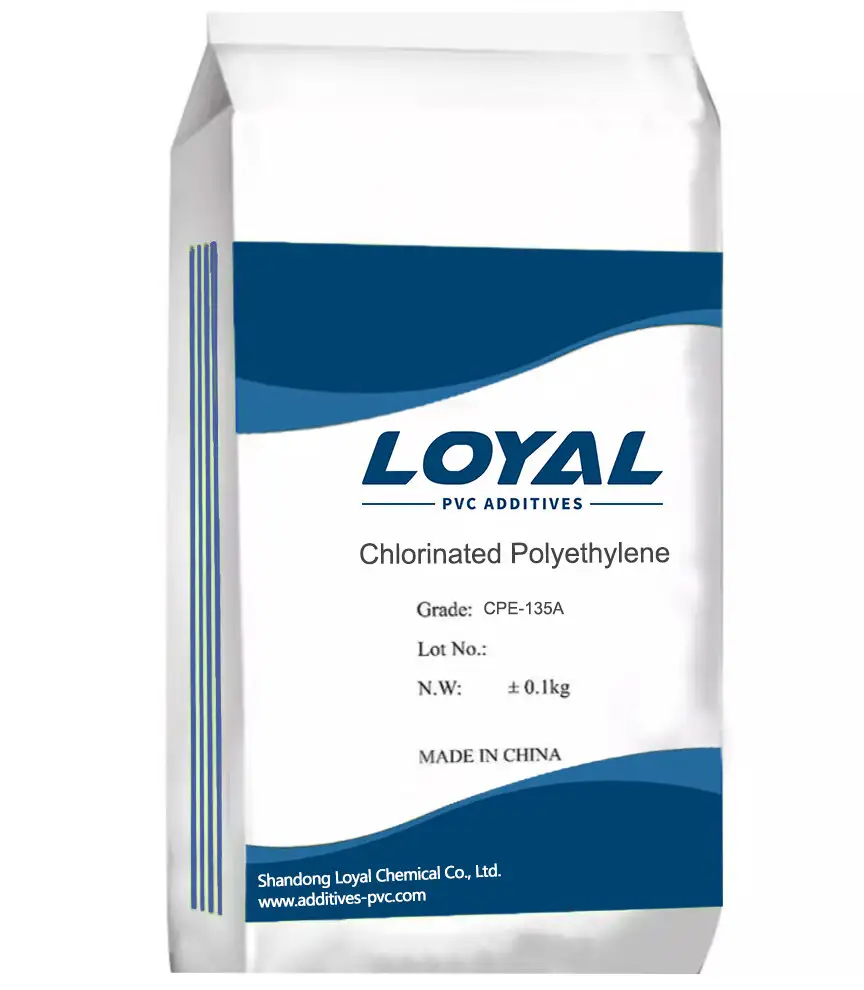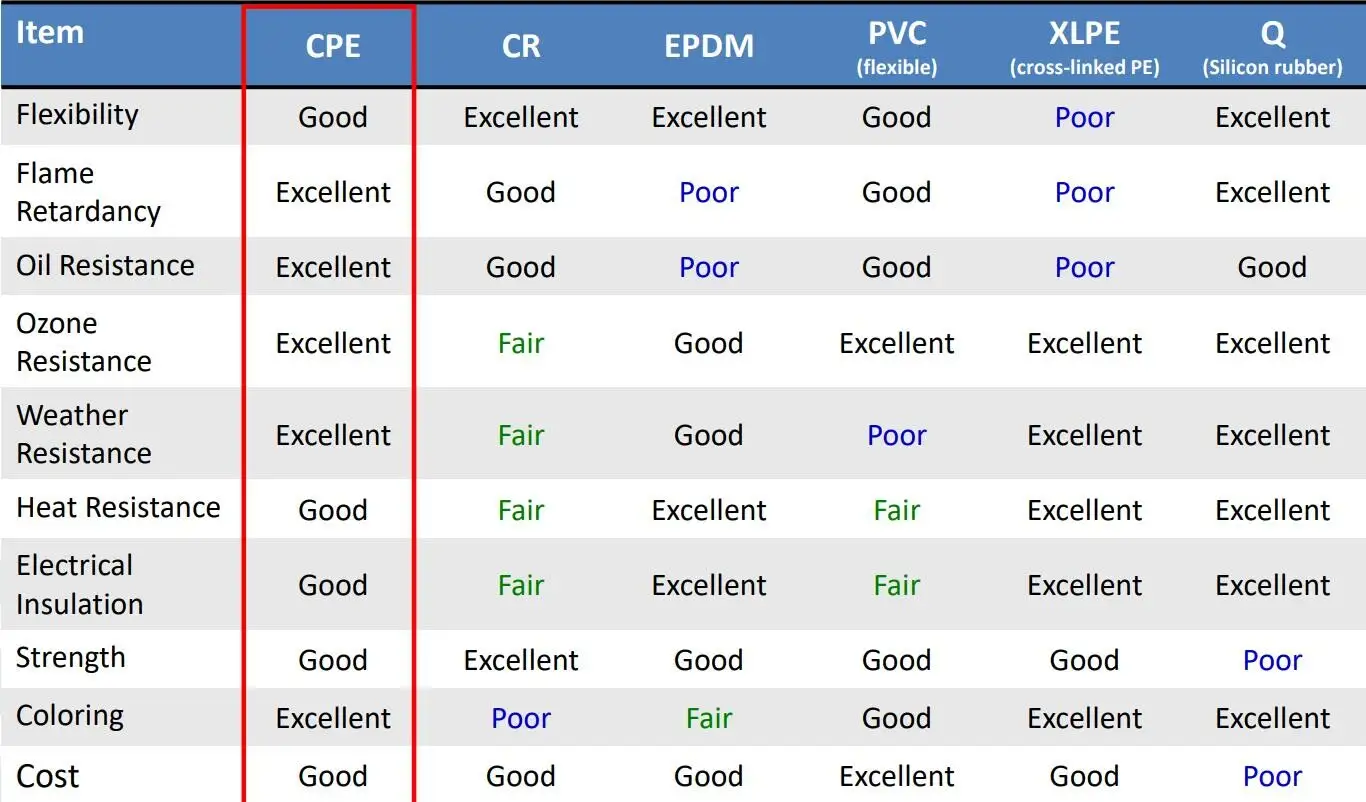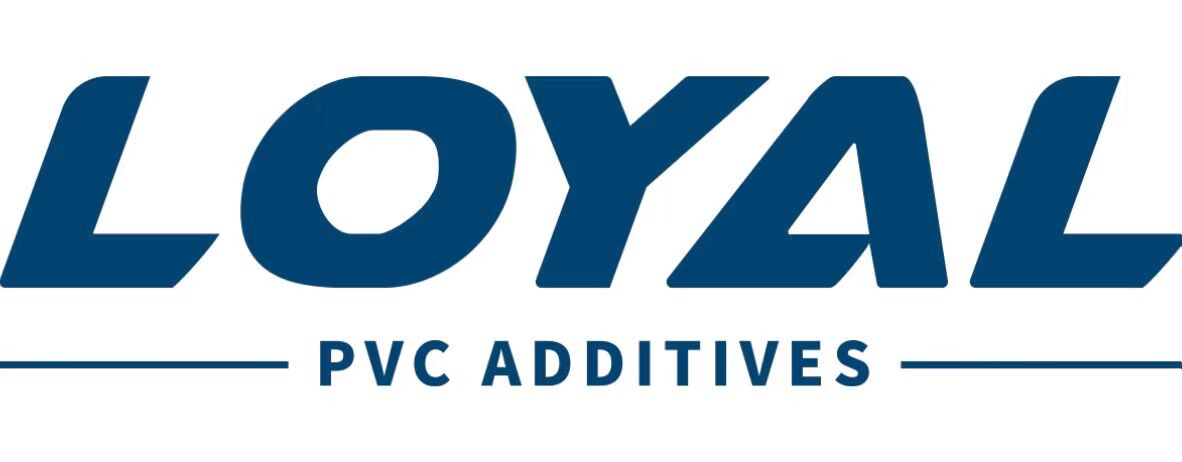Chlorinated polyethylene (CH2-CHCl-CH2-CH2)n is a polymer that has been treated with chlorine. It is used in a variety of applications, including electrical insulation, coatings, and adhesives. CPE is known for its high resistance to chemicals, heat, and UV light. It is also flame retardant and has good electrical properties.
CPE is used as a modifier for semi-rigid PVC wire harness.Improve low temperature properties (Brittle Temp. etc.) and Reduce the amount of plasticizer and prevent its bleeding.Loyal CPE Advantage: Flexibility, Weatherability, Heat aging resistance Flame retardancy and Chemical resistance.
Loyal CPE has high oil resistance and good heat resistance.
Loyal CPE is chlorinated elastomer. You have to put stabilizer(acid acceptor, antiaging agent) to prevent dehydrochlorination.
Don’t add heavy metal compounds like Iron or Zinc that accelerates degradation.

CHLORINATED POLYETHYLENE Recommend Products
CHLORINATED POLYETHYLENE Detail Introduction
Chlorinated Polyethylene (CPE) is a stable chemical, which is used as an active ingredient in many industrial processes. CPE is also known as chlorinated polyethene. It gets the chlorine from its chloride content where it can make plastics and synthetic rubber.
What are its characteristics?
Chlorinated polyethylene (CPE) is a highly versatile plastic that offers a unique combination of properties. It is durable and resistant to many chemicals, making it an ideal material for a wide range of applications. CPE also has good UV resistance and can be molded into complex shapes.
| Chlorinated Polyethylene - CPE Typical Properties | |
| Property | Value |
| HDT @ 0.45 MPa (°C) | 35 |
| HDT @ 1.80 MPa (°C) | 25 |
| Material. Drying hrs @ (°C) | NA |
| Melting Temp. Range (°C) | 150 - 170 |
| Mould Shrinkage (%) | 3 |
| Dielectric Strength (MV/m) | 12 |
| Dissipation Factor 1kHz | 0.1 |
| Dielectric Constant 1kHz | 5.5 |
| Mould Temp. Range (°C) | 20 - 40 |
| Linear Expansion (/°C x 10-5) | 18 |
| Elongation at Break (%) | 700 |
| Strain at Yield (%) | N/Y |
| Max. Operating Temp. (°C) | 60 |
| Water Absorption (%) | 0.01 |
| Oxygen Index (%) | 22 |
| Flammability UL94 | HB |
| Volume Resistivity (log ohm.cm) | 13 |
| Density (g/cm3) | 1.16 |
| Surface Hardness | SA70 |
| Tensile Strength (MPa) | 12.5 |
| Flexural Modulus (GPa) | 0.002 |
| Notched Izod (kJ/m) | 1.06+ |
What are the pros and cons to using it?
Chlorinated polyethylene (CPE) is a versatile plastic that offers many advantages over other materials. It is durable, has a high melting point, and is resistant to chemicals and UV radiation. However, CPE also has some disadvantages. It is difficult to recycle, and it can release harmful chemicals into the environment if it is not disposed of properly.
How do I use it in my life?
Chlorinated polyethylene is a synthetic rubber used in many different industries, most notably the automotive industry. It is also used in many other products such as electrical insulation, coatings, and adhesives. CPE is made by chlorinating ethylene, which is a process that gives the material its unique properties.
Is CPE safe?
Chlorinated polyethylene (CPE) is a polymer that has been treated with chlorine. It is used in a variety of applications, including electrical insulation, coatings, and adhesives. While CPE is considered safe for most uses, there are some concerns about its safety.
Some studies have shown that CPE can release chemicals that are harmful to human health. These chemicals can cause cancer and other health problems. There is also concern that CPE may be harmful to the environment.
What is chlorinated polyethylene used for?
Chlorinated polyethylene is a versatile plastic that can be used for a variety of applications. Common uses for CPE include:
-Piping and tubing
-Electrical insulation
-Coatings and linings
-Moldings and extrusions
-Adhesives
Chlorinated Polyethylene - 135A Applications
• Soft & Rigid PVC
• FR-ABS
• FR-PE (Wire & Cable)
as Modifier
• Wire & Cable Jacket
• Hose & Boots for Automotive
• Rubber for Construction
• Magnetic rubber
Rubber
• FR-TPE
| List of Chlorinated Polyethylene - CPE | |||||||||||||||||
| (Melting Property) | |||||||||||||||||
| Melt Flow Rate | JIS K7210 | g/10min | 0.1 | 1.7 | 1.8 | 1.6 | 12 | 8 | 120 | 65 | 70 | 3 | 9 | 25 | 0.8 | 1.2 | 25 |
| 180℃ 21.6kg | |||||||||||||||||
| Mooney Viscosity | JIS K6300 | - | ー | 85 | 90 | 105 | 45 | 65 | 20 | 20 | 30 | ー | ー | ー | ー | ー | ー |
| (121℃)ML1+4 | |||||||||||||||||
| (Physical Property) | |||||||||||||||||
| Crystallinity | DSC | J/g | <2 | <2 | <2 | <2 | <2 | <2 | <2 | <2 | <2 | 20 | 23 | 50 | 20 | 10 | 29 |
| (Electrical Property) | |||||||||||||||||
| Volume Resistivity | CPE 135A | Ω-cm | 2×1015 | 3×1015 | 2×1015 | 1×1015 | 3×1015 | 1×1015 | 3×1015 | 2×1015 | 1×1015 | 4×1016 | 4×1016 | 4×1015 | 3×1016 | 1×1016 | 2×1015 |
| Dielectric Tangent | CPE135B | - | 1×10-2 | 1×10-2 | 2×10-2 | 4×10-2 | 1×10-2 | 4×10-2 | 1×10-2 | 2×10-2 | 7×10-2 | 5×10-3 | 5×10-3 | 7×10-3 | 9×10-3 | 1×10-2 | 9×10-3 |
| Dielectric Content | 〃 | % | 4.3 | 4.3 | 4.5 | 4.7 | 4.3 | 4.7 | 4.3 | 4.5 | 4.9 | 3.6 | 3.6 | 3.7 | 4 | 4.4 | 4 |
| Cable jacket | ◎ | ◎ | ○ | ◎ | ◎ | ○ | ○ | ◎ | ◎ | ||||||||
| Application | Rigid PVC modifier | ○ | ◎ | ◎ | ○ | ○ | ○ | ○ | ○ | ||||||||
| Flexible PVC modifier | ○ | ◎ | ○ | 〇 | ○ | ○ | ◎ | ○ | |||||||||
| Most Suitable | FR ABS modifier | ○ | ○ | ◎ | ◎ | ◎ | |||||||||||
| Applicable | Rubber | ◎ | ○ | ○ | ◎ | ○ | ◎ | ◎ | |||||||||
| Magnetic rubber | ○ | ◎ | ◎ | ○ | ○ | ||||||||||||
| Adhesive/Coating | ◎ | ◎ | |||||||||||||||
| (Mechanical Property) | |||||||||||||||||
| Tensile Strength | JIS K6251 | MPa | 11.8 | 11.1 | 10.5 | 9.9 | 9.8 | 6.9 | 6.9 | 5.2 | 19 | 14 | 11 | 11.1 | 12.7 | 15 | 16.7 |
| Elongation | 〃 | % | 900 | 950 | 1000 | 800 | 1100 | 700 | 800 | 1200 | 400 | 850 | 700 | 800 | 400 | 500 | 550 |
| 100% Modulus | 〃 | MPa | 1 | 1 | 0.9 | 0.9 | 1.1 | 0.9 | 1.5 | 0.8 | 1.7 | 3.1 | 3.8 | 2.9 | 2.5 | 2.5 | 2.5 |
| Hardness | JIS K6253 | JIS A | 60 | 58 | 56 | 58 | 58 | 58 | 60 | 50 | 64 | 82 | 82 | 78 | 76 | 65 | 80 |
| Brittle Temp | JIS K6261 | ℃ | <-70 | <-70 | <-70 | <-70 | <-70 | -55 | <-70 | <-70 | -50 | -60 | -60 | -60 | -60 | -55 | -55 |
| Freezing Point | 〃 | ℃ | -32 | -32 | -24 | -15 | -33 | -15 | -24 | -28 | -3 | -27 | -27 | -16 | -17 | -8 | -1 |
How do you make chlorinated polyethylene?
Chlorinated polyethylene can be made through two different processes, suspension chlorination and solution chlorination. In the suspension chlorination process, CPE is suspended in water and then treated with chlorine gas. This process is typically used to make lower density CPE products. In the solution chlorination process, CPE is dissolved in a solvent and then treated with chlorine gas. This process is typically used to make higher density CPE products.
What is CPE in PVC?
Chlorinated polyethylene (CPE) is a type of plastic that contains chlorine. It is used in a variety of applications, including as a liner for pipes and as a insulation material. CPE is also used in the production of PVC (polyvinyl chloride) products.
CPE is made by chlorinating ethylene, which is a type of hydrocarbon. The chlorine atoms attach to the ethylene molecules and create a new compound. The resulting material is then used to create products or improve the performance of existing products.
Loyal Chlorinated Polyethylene - 135A has been used for various applications of Wire & Cable.
Jacket/Seath of rubber Wire & Cable jacket
- Effective: Oil resistance, Heat resistance and Flame retardancy
Jacket/Seath of Insulated (Crosslinked) PE for Wire & Cable jacket
- Effective: Flame retardancy, Anti-drip and Electrical properties after water immersion
CPE has a number of benefits over other materials, including its resistance to chemicals, its flexibility, and its durability. It is also relatively inexpensive to produce.

Despite its many advantages, CPE has some drawbacks. It can be difficult to work with and it can emit harmful fumes when heated. Additionally, CPE is not recyclable and it can take centuries to break down in the environment.
If you have any questions about CPE or PVC, feel free to leave them in the comments section below.
Is CPE environmentally friendly?
CPE is made from PVC, which is a type of plastic. PVC is not biodegradable, so it will remain in the environment for a long time after it is thrown away. CPE is also not recyclable.
What does CPE mean in recycling?
CPE stands for chlorinated polyethylene. It is a type of plastic that is used in many different applications. CPE is recyclable and can be recycled into new products.
LOYAL CPE USAGE FOR PVC APPLICATION | |||||
| Field | Application | Composition | Elaslen Grade | Blendable Polymer | Elaslen Function |
| Cabtyre/flexible | Transportation cable | Jacket: CPE | 401AY, 402B | EPDM | FR, Oil resistance, |
| cable | (Insulation: EPDM) | Flexibility | |||
| Power cable | Semiconductive layer of power cable | CPE blended PE incl. Carbon | 135A | EVA | Strippability |
| Vehicle cable | Jacket: CPE (Insulation: XLPE) | 202KB, 402B | LDPE | FR, Chemical resistance, Flexibility | |
| 404B | |||||
| Electric appliance | Power cable Lead wire | CPE single layer | 401AY, 402NA | EPDM, EVA | FR, Oil resistance, Flexibility |
| 351AYS | |||||
| Portable cord | CPE single layer | 401AY, 402NA | EPDM, EVA | FR, Heat resistance, Flexibility | |
| 351AYS | |||||
| Industrial | Electronic wire | CPE Blended FR-XLPE Insulation | 202KB, 303BS | EVA, LDPE | FR, Electrical property |
| 404B | |||||
| CPE Blended FR-PE Insulation | 404B | LDPE, HDPE | FR, Flexibility | ||
| Communication | Telecommunication cable | CPE Blended PVC Insulation | 401AY | PVC | Low temp property, Lower plasticizer |
| PMMA optical fiber | CPE Blended FR-PE Insulation | 303BS, 404B | LDPE | FR, Zero plasticizer | |
What is CPE 135A?
CPE135A is a type of plastic that is made from chlorinated polyethylene. It is a durable and strong plastic that is often used in the manufacturing of pipes and tubing. CPEA is also used in the production of wire and cable insulation.
CPE 135A has several benefits over other types of plastics. It is resistant to chemicals, UV light, and abrasion. CPEA is also a flexible plastic, which makes it ideal for use in applications where flexibility is important.
CPE135A has a number of drawbacks as well. It is not as easy to recycle as other types of plastics. CPEA can also release harmful chemicals into the environment if it is not disposed of properly.
Overall, CPE 135 A is a strong and durable plastic that has many benefits. However, it is important to be aware of its drawbacks before using it in any application.









